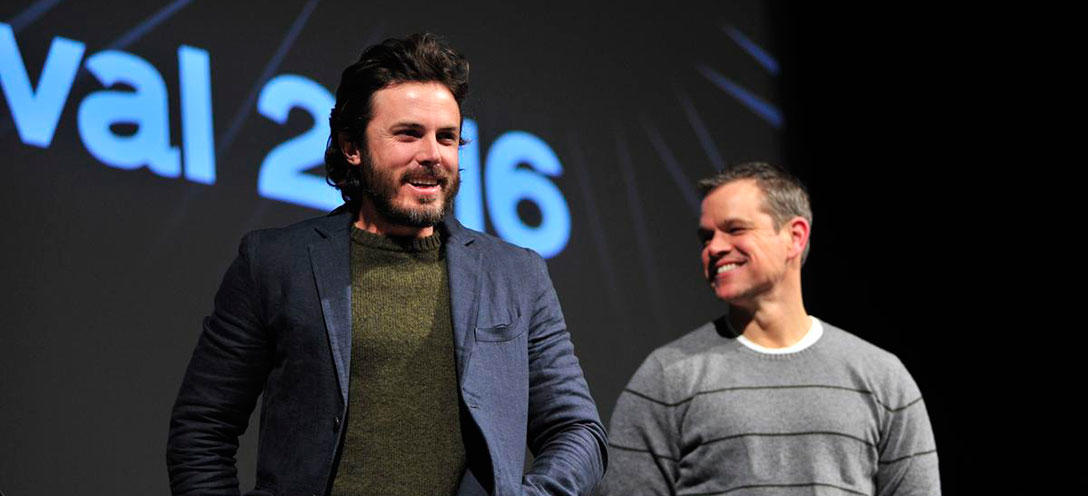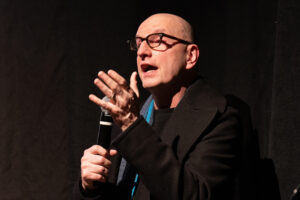Actor Casey Affleck and producer Matt Damon at the premiere of ‘Manchester by the Sea.’ ©Sundance Institute | Jonathan Hickerson
Sundance Institute
Sundance.org is dispatching its writers to daily screenings and events to capture the 10 days of festivities during the 2016 Sundance Film Festival in Park City, Utah. Check back each morning for roundups and insights into our experiences throughout the Festival.
Manchester by the Sea
By Eric Hynes
Every January, there are a few films that seem destined, from the moment they premiere at the Festival, to be talked about for the rest of the year to come. Judging from its emotionally devastating unveiling at the Eccles Theater yesterday afternoon, one of those 2016 representatives will be Kenneth Lonergan’s Manchester By the Sea. Lonergan’s follow-up to the critically beloved Margaret, and his first return to Sundance since taking home the Grand Jury and Waldo Salt Screenwriting prizes in 2000 for You Can Count On Me, the new film stars Casey Affleck as a New England man haunted by tragedy, struggling to care for a teen nephew (newcomer Lucas Hedges), who’s suffering through loss of his own.
“I have an aversion to the idea that there’s some kind of closure or catharsis. I guess people find ways to live with real tragedy. But some people don’t,” Lonergan said during the post-screening Q&A. “I thought that maybe those people deserve to have a movie made about them too. I’ve seen a lot of really good movies about people coming fully back to life. I wanted to do something different, something that seemed a bit more understandable to me.”
When asked how they dealt with the weight of the material, and if getting into their characters affected their real lives in any way, the actors cast back to the greatness of the script, and to the safe and guiding hands of their director. “Being that character meant trying to understand the complexity of what Kenny had written,” Affleck said, “looking for different ways of playing things, different ways of looking at a scene or thinking about a scene. Remaining open to things that seem counterintuitive in the moment. Being that character that was so well written, it made me a better actor.”
“In my limited experience doing movies and theater, doing scenes and playing roles that demand a certain amount from you emotionally is often more fulfilling and therapeutic than it is destructive,” said Hedges, a breakout candidate after this performance. “It’s probably the biggest role I’ve had, and also the most demanding – the first role I’ve ever really got to play that had an arc. It was amazing to get to do that with Kenny, who’s really one of my favorite people on the planet, and Casey is genuinely one of my heroes – I told him that when I first met him in the audition. This is life changing. I’m a freshman in college. And I go to a school for acting, and it’s really weird to leave a school where I’m getting taught and then… I come here. It doesn’t make any sense. I just want to get better.”
Not in the film but on the stage thanks to his role as producer, Matt Damon spoke about collaborating with Lonergan, and how Affleck came to play a role he’d long desired. “Casey and I did one of Kenny’s plays in London 14 years ago, and Kenny’s our favorite writer. We went to Kenny with this idea, John Krasinski and I—and originally the idea was for me to direct this movie and John was going to be in it,” he said. “Then I read a very, very rough draft—it was about 4,000 pages—and I just begged Kenny, I said you have to direct it. And he eventually saw the wisdom of my thinking. And then I was going to be in it, but in a really bizarre and atypical fit of generosity, I gave it to Casey. And immediately regretted it. Basically it’s one of the best roles I’ve ever seen.
“I had a full slate and I wouldn’t be able to do this movie until next year, and they could go last year with Casey. And I didn’t want to get in the way of a great movie getting made. I had already said to Kenny that I will not give up the role to anyone but Casey Affleck. And Casey instantly took the role. Because he saw what we all saw. I never made it through this script without crying. And I never made it through any iteration or cut of this movie without crying. It’s just absolutely devastating, and it’s one of the most beautifully written things I’ve ever come across. And I wish I was in it but I’m happy just to be attached to it.”
“I’ve never cried watching a movie that I’ve been in, unless it was out of utter disappointment,” Affleck added. “But I did today, and I think that’s a testament to the story and just how magically it works.” Kyle Chandler, who plays Affleck’s older brother in the film, made similar remarks. The deadpan Lonergan, however, was more critical of a film from which most people on stage and off were still trying to recover.
“Well, I think it needs a little work,” he said.
Tallulah
By Jeremy Kinser
The complexities of motherhood and its responsibilities are examined in Tallulah, the debut feature from writer-director Sian Heder that offers a dazzling showcase for actors Ellen Page, Allison Janney and Tammy Blanchard. The film premiered in the U.S. Dramatic Competition at the Eccles Saturday and digital distribution has already been acquired by Netflix.
Page and Janney are reunited nine years after starring in Jason Reitman’s Juno, but the similarities to that hit comedy end there. Here, Page (“Lu”) offers a terrific performance as a vagabond woman who, after being abandoned by her boyfriend and stealing a toddler from Carolyn, a spacy trophy wife (Blanchard), barrels into the life of Margo (Janney), the brittle, estranged mother of her boyfriend, who is also coming to terms with being newly single after her longtime husband (John Benjamin Hickey) has left her for a younger man (Zachary Quinto). “Lu” convinces Margo that she’s the baby’s grandmother and, against many odds, the two women form an intricate alliance.
In the Q&A that followed the film, Heder informed the audience that the story was inspired by her own experience as a young woman in Los Angeles while working as a babysitter at a high-end hotel. “I was so disturbed by the behavior of this mom that I really wanted to take the kid when I left, but I didn’t,” she revealed. “I thought about who would. I had this character in my head and suddenly I felt like I had the plot of the movie. It spun out from there to explore this idea of who was meant to be a mother and who wasn’t.”
It was the complex script by Heder, known for her superb work on the Netflix hit Orange Is the New Black, with its meaty, multi-dimensional characters that attracted the trio of actresses to the project. “It’s one of those roles that’s brand new,” Page said. “I’d never read a character like that before.” Janney added that after reading the script, she believed she could relate with Margo’s pain. “There’s the sense that these women are all going to move on and evolve and be better people.”
Blanchard, best-known for her stage work and winning an Emmy for playing the title character in Life with Judy Garland: Me and My Shadows, is a standout. For the challenging role of Carolyn, Heder said she needed “someone to be this shit show and be redeemed by the end.” She noted, “Tammy came in and gave this audition and my jaw was on the floor.” At this, the audience erupted in applause.
Heder compared the character to a toddler and added that her own experience with motherhood (she was the mother of a toddler and six-months pregnant with a second child during the making of the film) caused her to rewrite a more complex character who somehow redeems her actions by the end of the film. She noted that “even though she’s dark and over the top, in some ways she represents a thing I think a lot of women feel.”
Love & Friendship
By Jeremy Kinser
Whit Stillman’s elegant, witty Love & Friendship, based on Lady Susan, an unpublished novella by Jane Austen, premiered at the Eccles on Saturday night. Unsurprisingly, the pairing of Stillman, known for his sophisticated comedies of social mores, and Austen, beloved for her 19th century romantic fiction, proved to be as well-made a match as any that might appear in the works of the English author. Before the screening, Stillman, who made his Sundance debut in 1990 with Metropolitan, even joked to the audience that his films “have often been accused of being set in Georgian times.”
The story follows Lady Susan (Kate Beckinsale), a beautiful scheming widow who visits wealthy in-laws on their country estate while waiting out gossip about her romantic indiscretions as it passes through polite society. While living there, she enlists her American friend Alicia Johnson (Chloe Sevigny) to help secure a husband for herself and her rather reluctant debutante daughter, Frederica.
The period comedy serves as a reunion for actors Beckinsale and Sevigny, who costarred in Stillman’s 1998 comedy The Last Days of Disco. Sevigny noted that it was “nice to have the familiarity already there.”
Among the liberties Stillman said he took in adapting Austen’s work, which he described her as leaving “concluded in a sense but not completed,” was providing an American background for Sevigny’s character because it seemed a good idea to have the experience of the American exiles in London. The actress joked that it was because she couldn’t nail the British accent.
Despite the exquisite work from the two female leads, it’s the performance of Tom Bennett as Sir James, an amusing, but wealthy idiot who becomes a pawn in Lady Susan’s plans, who wowed the premiere audience. It’s another character that Stillman embellished from the original text after watching the actor’s screen test. “[Bennett] created this character based on a couple of scenes that were in the novel,” Stillman told the crowd. “He was so exciting that I wrote more for him. That’s a scene that’s more film than novel.”
The director admitted that he’d hoped to make this film for many years. “I think those who love Jane Austen want another book in the library so this is a chance for something else to be available,” Stillman added.
Christine
By Eric Hynes
For his return to the Festival after debuting the brutal Simon Killer in 2012, and producing last year’s wrenching James White, director Antonio Campos goes in a somewhat different direction for Christine, which premiered last night at the Library Theater. Tonally sliding between comedy and tragedy, the film is Campos’s first period piece, time travelling to 1974 and to the true story of a local TV affiliate in Sarasota, Florida, where 29 year-old reporter Christine Chubbuck struggled with loneliness, depression, and a shift toward “blood and guts” TV news—a trend that she bristled against.
Exploring that idea of sensationalizing the news was a major draw for Campos, who worked from a script by Craig Shilowich. “The idea of sensationalizing the news is something you just need to watch local TV news for five minutes and know that’s the way it works. And going from film to video and the speed at which information is gathered and put out there—all that stuff starts at this time,” he said, during the post-screening Q&A. “For me it just felt like that’s the beginning of the trend that we’re still living in today.” Another draw was the character of Christine herself. “I was fascinated by her. I cared about her, understood her. I thought she was strange, and funny, and tragic.”
To play the part of Christine, Rebecca Hall described an intense process of immersing herself in aspects and artifacts of Chubbuck’s life, and then forging her own take on the character. “The only way I can describe it is a kind of incubation,” she said. “I read a lot of stuff about borderline personality and depression, and tried to understand that on a technical level, then I let go of that. Then I watched 15 minutes of her interviewing on her show. And that’s all I had to go on in terms of her. And then I also had to let go of that. And then I sort of used my gut to try to create someone and try to feel what I believe she was feeling. It was a lot of absorbing, and sitting on it, and slowly she arrived.”
The intensity and purposefulness with which Hall approached the job was apparent in the way she described how she achieved the distinctive accent she uses in the film. “There’s a tiny bit of her doing the Sun Coast Digest,” she said, referencing the show Chubbuck hosted, “which gave me enough of the sounds to know that her accent was Cleveland, Ohio, where she was originally from, with taints of having lived in Florida and Boston, and her own particular sound, which was very low. Looking at a clip of someone on television isn’t necessarily what they’re going to sound like all the time. I’m aware of that. So there was a lot of looking at that and then using my imagination.”
It didn’t take long during the Q&A for someone to ask Hall if she’d seen the other film about the Christine Chubbuck story, Kate Plays Christine, which premieres tonight as part of the U.S. Documentary Competition. “No, I didn’t hear a peep about it until it was going to be screening here, then someone told me about it,” she said. Then, after a long pause that seemed commensurate with the strange confluence of two such films in the Festival, she added: “I’d like to see it.”




